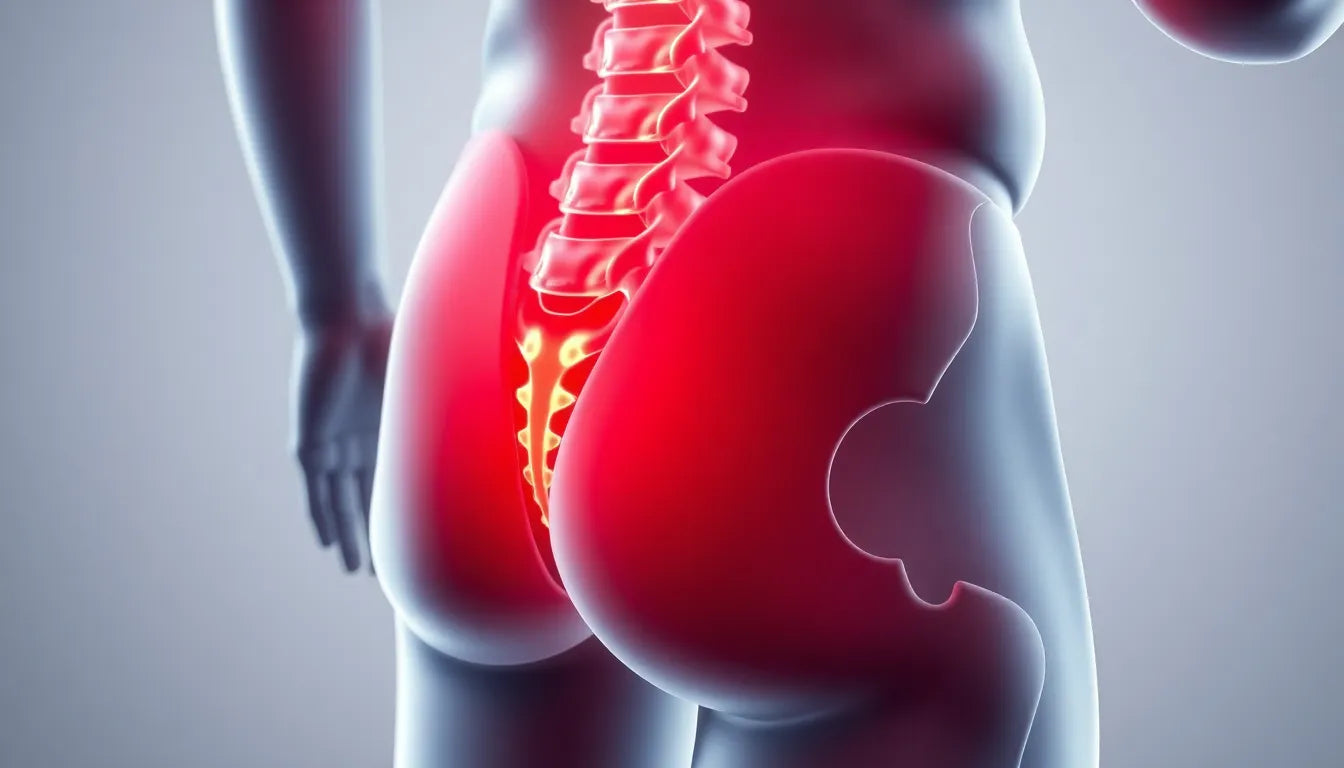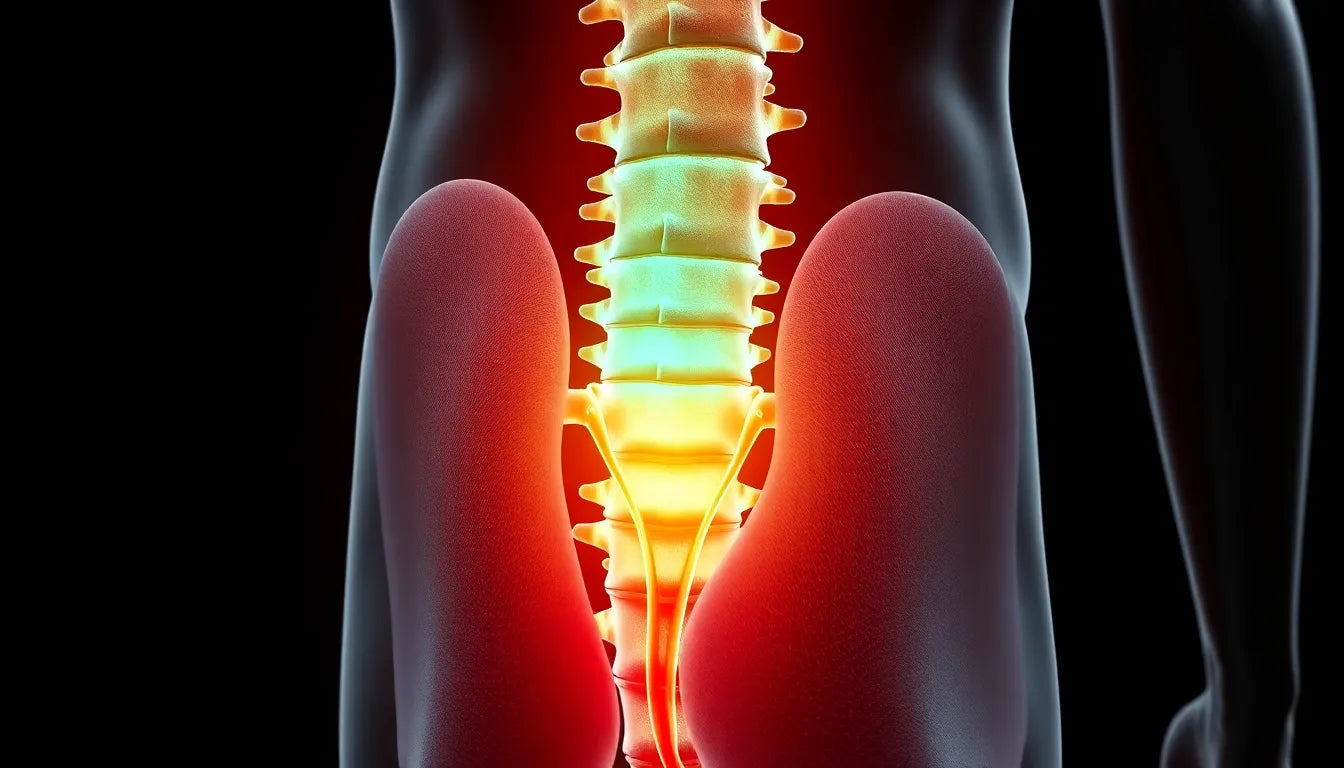Dealing with a herniated disc can be a challenging experience, significantly impacting daily life. One of the often-overlooked issues that can arise is difficulty with bowel movements. Understanding the connection between herniated discs and bowel problems is crucial for anyone seeking to manage their symptoms effectively. A herniated disc occurs when the soft center of a spinal disc pushes through a crack in the tougher exterior casing. This can lead to nerve compression, which in turn affects various bodily functions, including those related to bowel movements.
the impact of herniated discs on bowel movements
When a herniated disc compresses nerves, particularly those that control pelvic organs, it can lead to constipation or bowel dysfunction. This is because the nerves responsible for regulating bowel movements are located in the lower back, where herniated discs frequently occur. Although severe cases of bowel dysfunction due to a herniated disc are rare, they require immediate medical attention. For most individuals, the challenge is managing mild to moderate symptoms that can significantly affect comfort and quality of life.
importance of addressing bowel issues
Addressing bowel issues is essential for maintaining overall health and comfort when dealing with a herniated disc. Ignoring these problems can lead to further complications, such as increased pain, discomfort, and even more severe digestive issues. By understanding the relationship between spinal health and digestive function, individuals can take proactive steps to alleviate symptoms and improve their quality of life.
setting the stage for solutions
The goal of this post is to provide practical tips and medical insights for managing bowel movements when living with a herniated disc. From understanding the role of physical therapy and exercise to adopting practical daily habits, there are several strategies that can help. Additionally, medical management options and bowel programs can offer further support for those experiencing significant difficulties. By combining these approaches, individuals can find relief and regain control over their bowel health.
In the following sections, we will delve deeper into specific exercises, posture tips, and medical interventions that can aid in managing bowel movements effectively, offering a comprehensive guide to navigating this aspect of life with a herniated disc.
physical therapy and exercise for bowel management
Physical therapy plays a crucial role in managing both pain and bowel function for individuals with a herniated disc. Engaging in targeted exercises can help strengthen the pelvic floor muscles, improve lumbar area strength, and reduce muscle tension, all of which are essential for supporting bowel movements. Among the most effective exercises are Kegel exercises, which focus on strengthening the pelvic floor muscles that are integral to controlling bowel movements. Additionally, bridges and gentle stretches can enhance spinal health, promoting better nerve function and alleviating constipation risks.
It's important to approach physical activity gradually and safely, as this can enhance circulation and reduce the likelihood of constipation. By incorporating these exercises into a regular routine, individuals can experience improvements in both their spinal health and bowel function, ultimately leading to greater comfort and quality of life.
practical tips for easier bowel movements
Adopting the right toilet posture can significantly ease bowel movements for those with a herniated disc. Using a small stool to elevate the feet while sitting on the toilet can help relax the pelvic muscles, making defecation easier. It's also crucial to maintain a neutral spine position to avoid aggravating the disc and nerves. This simple adjustment can lead to more comfortable and efficient bowel movements.
Incorporating daily habits that promote digestive health is equally important. Alternating foot positioning with a low stool during prolonged sitting or standing can reduce back strain. Additionally, engaging in regular, low-intensity physical activity can stimulate digestive processes and enhance overall bowel health. These practical tips, when combined with physical therapy, can create a comprehensive approach to managing bowel movements effectively.
medical management and bowel programs
For individuals experiencing significant constipation, medical management options are available and should be pursued under professional guidance. Stool softeners, bulking agents, and laxatives can be used to alleviate constipation, but it's important to consult a healthcare provider to ensure these interventions are appropriate and safe. In cases where nerve involvement is severe and there is a loss of bowel control, more advanced interventions may be necessary.
These interventions can include enemas or digital rectal stimulation, which can provide relief in more challenging cases. Although surgical solutions are rare, they may be considered for extreme cases of bowel dysfunction. However, most individuals with a herniated disc will find that a combination of physical therapy, practical tips, and medical management can effectively address their bowel issues.
In summary, managing bowel movements with a herniated disc requires a multifaceted approach that includes physical therapy, practical daily habits, and, when necessary, medical management. By implementing these strategies, individuals can find relief and maintain their quality of life while navigating the challenges of living with a herniated disc.
when to seek medical help
While many individuals with a herniated disc can manage their symptoms with lifestyle adjustments and medical guidance, it's crucial to recognize when professional intervention is necessary. Red-flag symptoms, such as a sudden loss of bowel or bladder control, require immediate medical attention, as they may indicate severe nerve compression. Distinguishing between mild constipation, which can often be managed at home, and more serious conditions is essential for timely and effective treatment.
For those experiencing persistent or worsening symptoms, consulting a healthcare provider can help determine the best course of action. A medical professional can assess the severity of the condition and recommend appropriate interventions, whether they involve conservative management or more advanced treatment options.
visual aids and how-to guides
To enhance understanding and implementation of the strategies discussed, visual aids such as step-by-step illustrations or videos can be invaluable. These resources can provide clear guidance on exercises and toilet posture techniques, ensuring that individuals can effectively incorporate them into their daily routines. By following visual guides, individuals can better understand the correct form and technique, reducing the risk of injury and improving outcomes.
For those new to physical therapy exercises or adjustments in toilet posture, starting with visual aids can build confidence and ensure that the techniques are performed correctly. Many online resources and healthcare providers offer these guides, making them accessible for anyone seeking to improve their bowel management with a herniated disc.
conclusion
Managing bowel movements with a herniated disc requires a comprehensive approach that combines physical therapy, practical daily habits, and medical management when necessary. By understanding the connection between spinal health and bowel function, individuals can take proactive steps to alleviate symptoms and improve their quality of life. Consulting healthcare providers for personalized advice ensures that individuals receive tailored recommendations that address their unique needs.
frequently asked questions
What are the symptoms of nerve involvement in bowel issues?
Symptoms of nerve involvement can include constipation, difficulty in bowel movements, or in severe cases, loss of bowel control. These symptoms arise when a herniated disc compresses nerves that regulate bowel function.
Can physical therapy really help with bowel movements?
Yes, physical therapy can be highly beneficial. Targeted exercises, such as Kegel exercises and gentle stretches, can strengthen muscles and improve nerve function, aiding in regular bowel movements.
What should I do if I experience severe bowel dysfunction?
If you experience severe bowel dysfunction, such as a sudden loss of bowel control, seek immediate medical attention. This could indicate serious nerve compression that requires urgent intervention.
Are there dietary changes that can help?
Yes, dietary changes can support bowel health. A diet high in fiber, along with adequate hydration, can help alleviate constipation and promote regular bowel movements.
How long does recovery from a herniated disc take, and will bowel issues resolve?
Recovery time varies depending on the severity of the herniated disc and the individual's overall health. Many people experience improvement with conservative treatment, but persistent bowel issues should be evaluated by a healthcare provider to determine the best course of action.
Sources
- "Herniated Disc and Constipation: Understanding the Connection." MoreGoodDays.com.
- "Herniated Disc and Bowel Complications: What You Need to Know." Barricaid.com.
- "Managing Herniated Disc Symptoms: Physical Therapy and More." New York Pain Care.
- "Practical Tips for Living with a Herniated Disc." American Academy of Family Physicians.
- "Bowel Management After Spinal Injury." MSKTC.org.


















